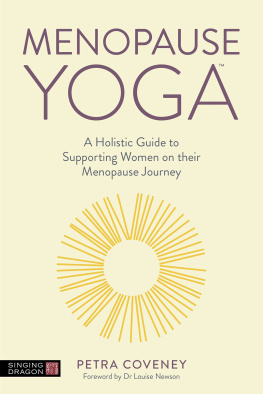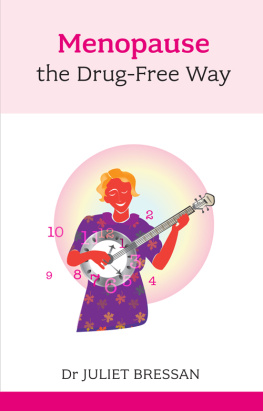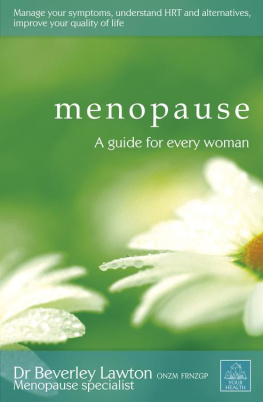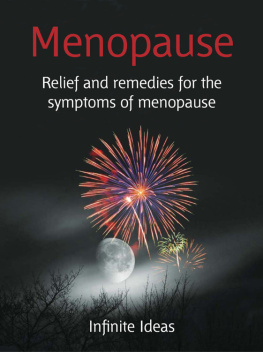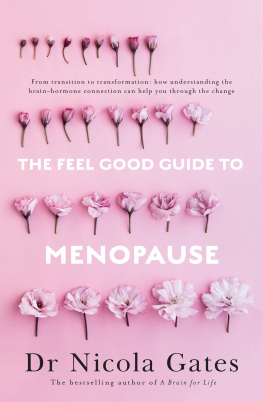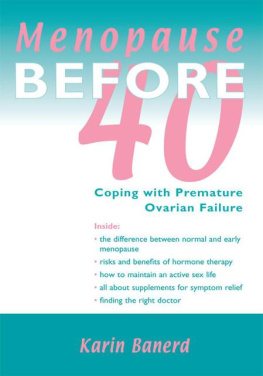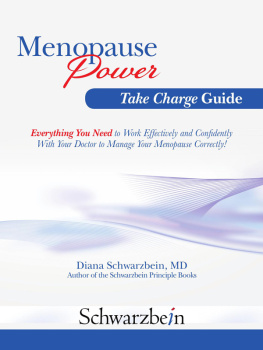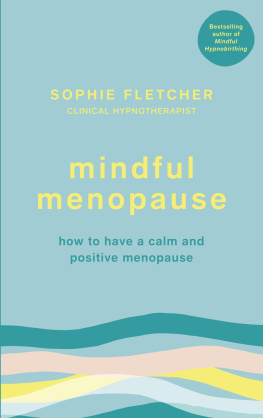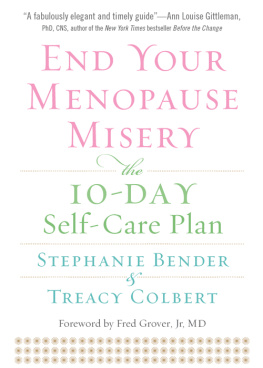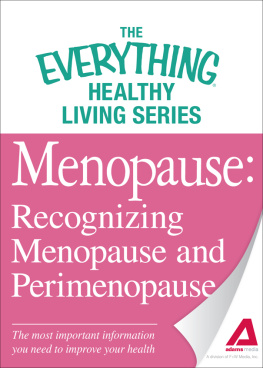Menopause:
The One-Stop Guide
This practical guide is a welcome addition to the range of material now available to help women understand their menopause. Kathy Abernethy is a highly qualified and experienced specialist nurse, greatly respected within the healthcare profession. She understands that menopause is an intensely personal experience, and offers thoughtful advice for treatment and lifestyle options.
The book is especially helpful in providing clear definitions, answers to frequently asked questions and more than 200 anonymised quotes from patients expressing their concerns and anxieties during consultations at the authors clinical practice. This all gels into an easily digestible format that will inform, reassure and, as the title suggests, guide women through this inevitable stage of their lives.
Medical Advisory Council,
The British Menopause Society
Kathy Abernethy works as part of an award-winning NHS menopause team in London and has a private clinic in south-west London. She holds a Masters in reproductive womens health, and speaks and writes regularly on the topic of menopause. She has written a book for nurses on menopause and HRT as well as numerous articles. Kathy raises awareness of the impact of menopause at work by delivering workplace sessions to staff and managers of various organisations throughout the UK, and in 2017 she was elected chair of the British Menopause Society, the leading professional organisation for the field, having been an active member since its inception in 1989.
Menopause:
The One-Stop Guide
A practical guide to understanding and living with the menopause
Kathy Abernethy

First published in Great Britain in 2018 by
PROFILE BOOKS LTD
3 Holford Yard
Bevin Way
London
WC1X 9HD
www.profilebooks.com
Copyright Kathy Abernethy 2018
The moral right of the author has been asserted.
All rights reserved. Without limiting the rights under copyright reserved above, no part of this publication may be reproduced, stored or introduced into a retrieval system, or transmitted, in any form or by any means (electronic, mechanical, photocopying, recording or otherwise), without the prior written permission of both the copyright owner and the publisher of this book.
The advice and recommendations given in this book are provided in good faith, but no responsibility for any consequences, however caused, of acting on them will be accepted by the author or the publisher. If in doubt, seek suitable advice from a healthcare professional.
A CIP catalogue record for this book is available from the British Library.
eISBN 978 1 78283 366 6
Contents
Introduction
How can you write a whole book on menopause? Isnt it a natural event, one that all women will eventually experience? As women, dont we know the signs and symptoms changes in periods and hot flushes? Shouldnt we just get on with it? Well yes, many women do just get on with it, but in my many years of specialising in this area of health, I have met countless women who do not fully understand the changes that this time of hormone fluctuation can bring, or how long such symptoms may last. Yes, they all know about flushes and sweats, but many women worry about other symptoms, like mood changes, itching, tiredness, bladder symptoms and poor memory, not aware that these too can be linked to menopausal changes. In consultations with women, I spend a lot of time, saying yes, thats normal, as they take me through the often numerous symptoms they are experiencing. Women express their relief to have someone to talk to, someone to listen to their own particular experience of menopause and someone to guide them through the treatment options open to them. The women I see do not want to just walk out with a prescription; they want to understand the menopause, the effects it can have on the body and the different ways they might choose to help symptoms, both medical and non-medical.
Not all women have a normal menopause, whatever we mean by that. Some will experience menopause suddenly, as a result of surgery or after treatment for cancer. Some may become menopausal by opting to have their ovaries removed in order to avoid cancer. Others will be very young, perhaps even still in their teens, when their ovaries stop working and so will have all the effects of early menopause. These women need support, information and treatment. For a few women, the symptoms of menopause will be very severe, affecting work, home and social life on a daily basis, sometimes for months or even years.
The women I see week in and week out tell me that no one has taken the opportunity to explain the changes and symptoms, discussed health after menopause, or explained that purposeful lifestyle changes around menopause can improve health well beyond menopause and even into old age. Some of the effects of menopause are inevitable, but others can be offset by positive lifestyle changes, for example to improve bone and heart health.
Menopause is no longer a taboo topic. In much of society (although, sadly, still not all), women will talk about menopause, whether its the symptoms, the physical changes or the psychological effects it can sometimes have you can read about it everywhere. The media has finally taken notice and some (still only a few) celebrities have been open about their own menopause experiences. There have been television and radio programmes about menopause and numerous womens magazines articles about it. Even the government has reported that women at work may be affected by menopause and the Chief Medical Officer, the most senior advisor on health matters to the government, has raised the topic, saying that menopause should be as freely discussed at work as any other health topic.
Yet, time and time again, women tell me that they have struggled to get help on a personal level; that they do not know which media stories to trust; and that GPs, while sympathetic, have little time to discuss the matter, or balance treatment options for them in a way that is meaningful. In short, women still feel alone at menopause, searching the internet and scouring leaflets to put together the information they need to make informed choices. This one-stop book on menopause aims to fill the gap, providing practical information about menopause, explaining what is normal and how you might choose to cope with it all. It will help you understand that there is more to the change of life than simply stopping periods and aims to equip you to make positive choices at this important time. Throughout the text are anonymised quotes from real women who I have encountered in my clinical practice, and which express the kind of anxieties that many women have about going through the menopause.
Whether you see menopause as a natural event that does not need medical intervention, or whether you are open to all the medical help on offer, this book is for you.
chapter 1
Menopause
What is normal?
You would think as a woman I would know about these things, hormones and so on, but I really dont. No one prepares you.
In America, it is sometimes called the third talk: you know you get a talk on starting periods, one on sex and we need one on menopause!
As you approach your late forties, you are likely to be expecting that menopause will happen soon if it hasnt already. In the UK the average age of menopause is 51, so menopause usually happens when you are between the ages of 45 and 55. You would think, therefore, that it would not come as a shock, yet you may feel ill-prepared for it and surprised by the symptoms you experience. Unlike pregnancy, you wont find that friends raise the topic very often, or pass on books they have used or even give you their own tips and advice. Possibly they are going through it too, but it tends not to be coffee shop talk. Even your mother will probably brush it off, saying that she doesnt remember or that it was no problem. Look online, and you will see a huge amount of information. But what is reliable? What do you believe? Is it really that bad? What is normal?
Next page

